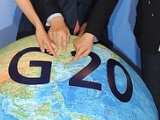The “Northeast Asia Paradox” in the G20
1 Mar 2012
The G20 lies at the center of a global power shift away from OECD countries towards emerging economies. In addition to tackling financial and economic crises and providing a platform for global policy coordination, the G20 also plays a crucial role in managing what its members hope will be a measured distribution of power over time. However, the G20, much like any other organization, can also be instrumentalized. It can be an arena of competition and potential conflict, as Yves Tiberghien argues. Indeed, in his view we are experiencing a "great G20 game" between the US, the EU and China.
Parts of this great game are fairly clear. While the US would prefer to deal with China bilaterally, China is afraid of getting locked into this type of dialogue and prefers to operate through a multilateral framework, or so Tiberghien argues. The EU, in turn, wants to use the G20 as a vehicle to reform the global economic and financial order as it sees fit. And between these three elephants are middle powers such as Japan, South Korea, Brazil, India and Russia. They continue to mediate between the Big Three, as Korea did particularly well during its recent G20 presidency.
Of particular interest in this balancing act, however, is the relationship between China, Japan and South Korea. They may be neighbors but when it comes to the G20 they have different interests. Japan belongs to the group of advanced and - relatively speaking - declining economies, China is on its way to becoming a hegemonic power, and Korea, as a newer member of the OECD, finds itself in the middle. What this means politically and militarily is that Japan and Korea remain close allies with the US rather than China. At the same time, however, the economic situation looks different. The three Northeast Asian countries are deeply integrated and their economic policies have followed a similar and successful model: state-led export growth, which has only compounded their monetary cooperation.
It's because of the above division of interests -- military-political versus economic -- that the three countries have not coordinated their policies towards the G20. This is especially surprising given that the G20 has historically dealt with economic and financial matters rather than security-related ones. So what's the problem? This is the question Yves Tiberghien tries to address in his paper "East Asian Politics and the Great G20 Game." In order to solve the "Northeast Asian Paradox," Tiberghien examines the domestic and international factors that shape China's, Japan's and Korea's positions in G20 negotiations. He argues that for all three countries political considerations win out over economic interests, and they do so because of the way power is distributed between government ministries on the one hand and political leaders and societal forces on the other.
Despite the above troubles, Tiberghien concludes that future leaders in China, Japan and South Korea will probably recognize their common interests, coordinate their G20 policies, and thereby exert global clout. If the three countries came forward with common policy proposals on issues such as capital flow regulation, for example, "they would likely carry the day, given their position at the center of the spectrum" of policy issues.
Such policy coordination, though, would not only give Northeast Asian countries a prominent place at the G20 table. China, Japan and South Korea could "bring the G20 forward" by facilitating compromises not only between the US and the EU, but also between developed and developing countries. Finally, Northeast Asian cooperation at the G20 could point towards enhanced security in a region which remains dominated by power politics.
In order to explore the above issues in greater depth, please refer to the following question and answer session hosted by the East Asia Institute (EAI), an ISN partner. As part of his observations, Yves Tiberghien discusses the "great G20 game" and explains the "Northeast Asia paradox." He also discusses China's future role in global governance as well as the contribution of South Korea and civil society organizations to the G20 process.
1) Overview of the G20 'Game'
Question: Could you describe to us some of the characteristics of the G20 power game, specifically the relationship between the United States, China, and Europe?
2) The Northeast Asian Paradox in the G20
Question: In your EAI working paper you look at how China, Japan, and South Korea have not effectively cooperated together at the G20-level, despite 'positional similarities' among them. What are some of the reasons for this lack of cohesion?
3) China's Future Role in Global Governance
Question: China will increasingly play a stronger role in global governance and has a very important position in the G20. How do you foresee China's future role in global governance, particularly in relation to the G20?
4) Assessment of South Korea in the G20
Question: In 2010, South Korea held the chair for the G20 and hosted the Leaders' Summit in Seoul. How would you assess Seoul's recent role in the G20, particularly when it comes to some of the agenda items it has tried to push forward, such as global safety nets?
5) The G20 and the Role of Non-Governmental Organizations (NGOs)
Question: A recent policy report by the EAI recommended that the G20 should work more closely with NGOs, particularly why they are playing a greater role in global governance. How do you see the prospects for greater cooperation between NGOs and the G20?

